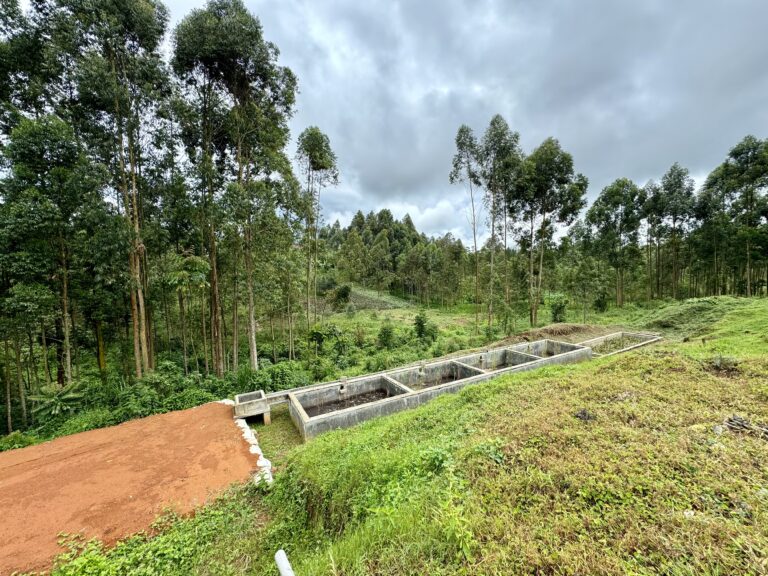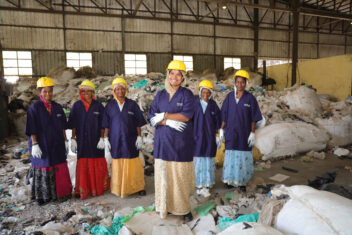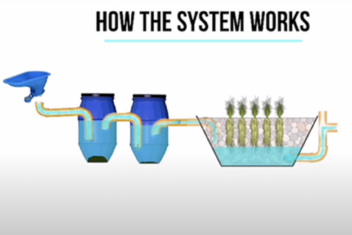Bringing sanitation into the climate conversation

The sanitation sector has been overlooked for too long in the conversation about climate change, but it is finally starting to gain attention. There is an increasing recognition that poorly managed sanitation and wastewater systems are not only a big contributor to carbon emissions, but also that climate change threatens existing sanitation systems and public health gains made over the past decades.
Growing understanding
Research plays a key role in enabling us to raise the profile and increase our understanding of complex WASH and climate connections, ultimately leading to better design and rationale for much needed climate financing for sanitation. This year two interns have been delving into this very issue with our FINISH Mondial (FM) team as part of their MA in Water and Sustainable Development at the IHE Delft Institute for Water Education.
“Researching the connection between climate and sanitation is crucial for improving public health, environmental sustainability, and resilience in the face of a changing climate. It enables the development of more effective, adaptive, and sustainable sanitation systems.”
The reflection of WASTE intern Farid Safi who is helping to increase research into this critical area by working with the FM team in India. Farid studied the Dhenkanal municipality of India and found that over 7,000 tonnes of CO2 are emitted every year through the sanitation system. These levels, however, were shown to have the potential to be reduced up to 68.2% by implementing ecological contain systems such as compositing pits and biogas digesters instead of the current simple pits and septic tanks.
FM contributes to climate change mitigation adaptation through fostering circular economy in sanitation by focusing on building inclusive climate-resilient sanitation systems and generating evidence to effectively advocate for scaling these solutions. To build adaptive capacities FM raises awareness in communities to understand the links between sanitation, health and climate change and mobilises local stakeholders and relevant (national and international) institutions into action.
Climate adaption in sanitation
“It is crucial to advocate for the adoption of technologies, like Biogas digesters, which can capture and reuse methane emissions. Additionally, there’s a pressing need to implement measures that enhance the resilience of sanitation systems against climate-related risks, such as flooding and drought.”
Water and sanitation infrastructure is compromised by both extreme and slow climate change events and becomes particularly vulnerable if design standards do not account for rapidly changing climate conditions. Floods for instance can have a devastating effect on poorly constructed sanitation systems, with human waste spreading into waterways and threatening safe water supplies.
As a result, FM has made improvements to over 1.4 sanitation facilities, including flood-proof toilets, through mobilising local finance and stakeholders. FM has also organised multiple sanitation hackathons for resilient and flood-proof toilets innovations, further bringing together research and implementation. This has led to, for example, four flood resistant toilets being piloted in waterlogged areas of the Satkhira and Kalaroa municipalities in Bangladesh; utilising hackathon technology.
A global conversation
The conversation is beginning to grow on a global scale too. At the recent COP28, over 120 countries signed the first ever ‘COP28 UAE Declaration on Climate and Health’ which places health at the heart of climate action and calls for acceleration of the development of climate-resilient, sustainable and equitable health systems. This includes a commitment to climate resilient sanitation.
A commitment which we are excited to see grow in our FM programme over the months to come as we continue to invest in building resilience against flood, drought and storm hazards through sanitation. And a commitment which we must not allow to fall off the climate change agenda – together we must continue the conversation and turn it into action.
Get in touch with our Climate and Circular Economy Expert, Sumeet Pawar ([email protected]), to learn more about our work in connecting climate to WASH solutions and look out early next year as we share innovative examples directly from the field.


